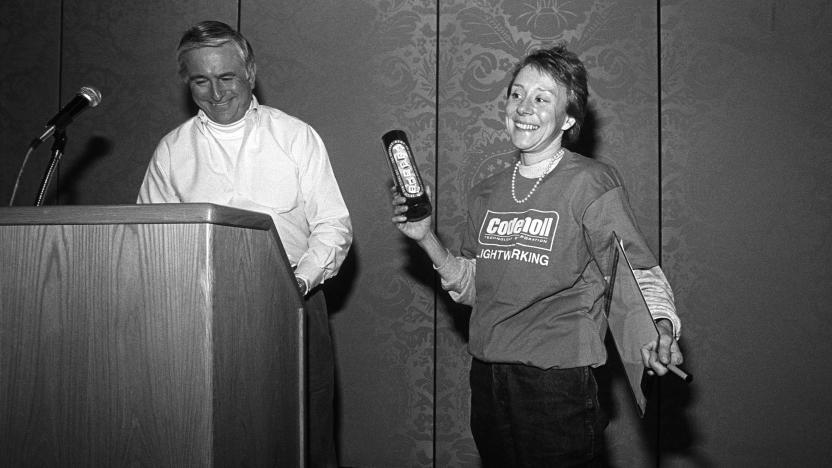microcomputer
Latest

Former Tandy CEO and PC innovator John Roach dead at 83
Roach led the push to bring the Tandy TRS-80 into American homes.

BBC Micro:bit computer now available to all for £13
After a couple of unforeseen delays, the BBC finally began delivering Micro:bit computers to Year 7 students across the UK in March. With the objective of distributing free microcomputers to an entire year group nearing completion -- around 80 percent of schools have received theirs to date -- it's time to let anyone else with an interest in coding loose on the little device. Pre-orders open today at element14, which manufactures the palm-sized 'puters, Microsoft's online store and many other resellers, with the first shipments expected in July.

Students finally get their hands on the BBC's Micro:bit computer
The BBC has begun delivering its tiny Micro:bit programmable computers to students today, with every Year 7 in the UK due to receive theirs over the next few weeks. The spiritual successor to the BBC Micro, which introduced a whole generation to computing back in the early eighties, was originally due to reach classrooms last October, just in time for the start of the new school year. Power supply problems and then "fine-tuning" issues manifested in significant delays, but after overcoming these setbacks to get the first batch to teachers in early February, it's finally time for kids to get coding with Micro:bits of their own.

BBC Micro:bit delayed further due to 'fine-tuning' issues
The BBC launched the "Make it Digital" campaign early last year as a multi-pronged effort to get our young ones interested in coding and other creative pursuits within technology. A key piece of the puzzle was the BBC Micro:bit, a tiny Raspberry Pi-like computer the broadcaster promised to distribute freely to Year 7 students throughout the UK. Originally, the development boards were supposed to hit desks last October, just a few weeks into the new school year. Power supply problems identified shortly before that deadline delayed the rollout, and now the BBC has revealed yet more problems have arisen that mean Micro:bits are unlikely to be widely available until the summer term.

The BBC's Micro:bit computers won't reach kids until next year
As part of a wider initiative aimed at teaching children the basics of computing and programming, the BBC created the Micro:bit development board (with a little help from some high-profile partners). Unveiled in its final form this July after years in the making, the broadcaster had originally planned to send out the first batch of Micro:bits to teachers this month, before issuing one million of the things to Year 7 students across the country in October. The BBC has said today, however, that a problem with the power supply identified on a small number of the microcomputers means that timeline has been pushed back by a couple of months.

Meet the Micro:bit, the BBC's tiny programmable computer for kids
The Raspberry Pi has been a huge success story for Britain, giving millions of people an affordable way to tinker and learn with pocket-sized hardware. Now, the BBC is hoping to make a similar impact with the "Micro:bit." Like the Raspberry Pi, this tiny computer has been created to help youngsters learn the fundamentals of programming and computer construction. Today in London, the broadcaster unveiled the Micro:bit's final design -- a rectangular, credit card-style board measuring 4cm by 5cm -- and some of the all-important hardware features. These include 25 red LEDs, which can show messages and facilitate games, two programmable buttons, an on-board accelerometer and magnetometer. The device also offers Bluetooth LE connectivity, a microUSB slot and five input and output (I/O) rings that can be hooked up with crocodile clips and 4mm banana plugs. It's been a while since the original BBC Micro was considered cutting edge, but even so -- this new device is roughly 18 times faster and 67 times lighter than its spiritual predecessor.

BBC to give out one million 'Micro Bit' computers to get kids coding
It's the first year of a major new coding curriculum in the UK, and now the BBC wants to play its part in training the next generation of star programmers. The broadcaster is developing a spiritual successor to the BBC Micro, called the Micro Bit, which will give students a physical companion in their path to coding competence. It's going to be a small, standalone device with an LED display that children can carry around with them and plug into a computer to continue their work. The hardware will be basic, as the BBC calls it a "starting point" for "more complex" devices such as the Raspberry Pi and Kickstarter-funded Kano kits. The project is still in a prototype phase, but the BBC claims it'll be ready to give away one million of the new microcomputers to year 7 students this autumn.


